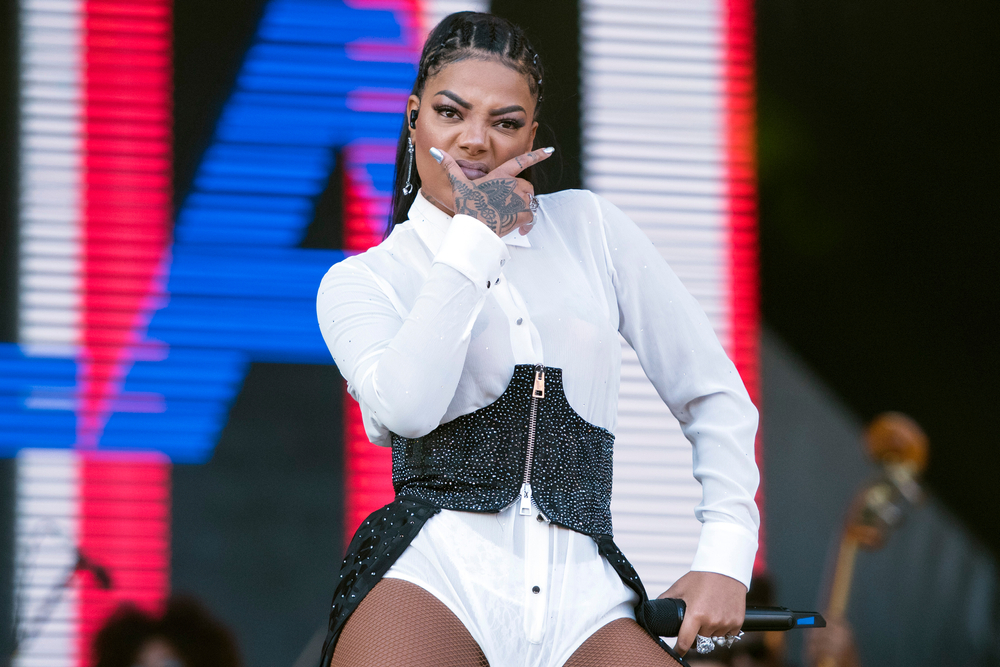Table of Content
ToggleIntroduction
Ludmilla, the Brazilian popstar, has become an icon in the contemporary music scene of Brazil, known for her vibrant performances and contributions to the genre of Funk Carioca. She emerged as a powerful voice in Brazil’s music industry, quickly rising to fame with a unique sound that blends traditional Brazilian rhythms with modern pop elements. Her journey from humble beginnings to becoming a household name is a testament to her talent and resilience, capturing the hearts of fans both within Brazil and internationally.
With a rich discography that showcases her versatility, Ludmilla has not only pushed the boundaries of the Funk Carioca genre but also dabbled in samba and other styles, reflecting her broad musical influences and ability to innovate. Her collaborations with other artists have further solidified her status in the music world, and her performances are known for their energy and authenticity. Off the stage, Ludmilla’s impact extends into her personal life and business ventures, and her activities are followed by a dedicated fanbase eager to see her next move.
Key Takeaways
- Ludmilla’s emergence as a Brazilian popstar symbolizes her remarkable influence in the music industry.
- Her musical style exemplifies a blend of Brazilian rhythms with contemporary pop, highlighting her diverse influences.
- Ludmilla’s achievements in music and beyond showcase her multifaceted career and cultural impact.
Early Life and Career Beginnings
Before adopting the stage name Ludmilla and gaining international recognition, the Brazilian popstar had her beginnings in Duque de Caxias, where her career took off under a different pseudonym.
Rise to Fame as Mc Beyoncé
Ludmilla, originally known as Ludmila Oliveira da Silva, began her ascent to stardom in the suburbs of Rio de Janeiro, specifically in Duque de Caxias. It was there that she embraced the vibrant rhythms of funk carioca and honed her craft. Her dynamic performances and unique sound quickly garnered local attention, providing the springboard for her future success.
Transition to Ludmilla
Mc Beyoncé was a persona that served her well but, seeking to establish a distinct identity and wider appeal, she transitioned to the stage name Ludmilla. This marked a new chapter in her career—one defined by a broader musical palette and increased creative control, as she continued to infuse her work with the energy of funk carioca.
Musical Style and Influences
Ludmilla’s musical repertoire is a vibrant reflection of her Brazilian roots, embodying a blend of Funk Carioca and Brazilian funk, and demonstrating a palpable influence from trailblazing Afro-Latina artists. Her style is an intricate tapestry of rhythmic patterns and cultural heritage.
Funk Carioca and Brazilian Funk
Ludmilla thrives in the energetic ambiance of Funk Carioca, a genre that has its genesis in the favelas of Rio de Janeiro, Brazil. This genre, a derivative of Miami bass and Gangsta rap, infuses electronic beats with Portuguese rapping and singing. It’s this musical scene that marked the launchpad for Ludmilla, where she crafted her unique sound.
Additionally, the artist taps into the mainstream vein of Brazilian funk, a genre that bridges the gap between traditional samba rhythms and contemporary pop melodies. This alignment with funk showcases her ability to pay homage to her cultural background while also navigating the broader spectrums of the pop genre.
Influence of Afro-Latina Artists
Ludmilla draws significant inspiration from prominent Afro-Latina artists, infusing her music with the essence of a rich and diverse heritage. These artists have paved the way for a unique sonic experience that celebrates their identities and stories through music.
Axé music, with its Afro-Brazilian roots, also finds its way into her musical style, indicating a sound that celebrates inclusivity and the fusion of cultural influences. Ludmilla’s skill in blending different genres positions her as a modern voice for Afro-Latina empowerment within the music industry. Her work not only entertains but also serves as a platform for cultural expression and social commentary.
Discography Highlights
Ludmilla’s journey through the Brazilian pop music scene is marked by an impressive discography that includes vibrant albums and chart-topping singles. She has successfully brought her unique sound to the masses, capturing attention on platforms like Spotify.
Popular Albums
- Numanice (Live): This live album showcases Ludmilla’s versatility and has resonated with fans for its authentic representation of her artistic evolution.
- Hello Mundo (Ao Vivo): A live recording that captures the essence of Ludmilla’s dynamic performances, further cementing her status as a pop powerhouse.
Hit Singles
- Vem Por Cima: A track that has captured fans’ hearts, radiating energy and rhythm that’s synonymous with Ludmilla’s name.
- Sou Má: Demonstrates her ability to blend genres, this single stands out as a testament to her creative prowess and has seen significant streaming figures on Spotify.
Collaborations and Performances
Ludmilla, a prolific Brazilian popstar, has made significant strides in her career through strategic collaborations and live performances. These partnerships and stage moments have played a pivotal role in expanding her presence both within Brazil and on the international music scene.
National Collaborations
On the national front, Ludmilla has joined forces with various artists to create hit songs that resonate with her Brazilian roots. Her collaborations with other Brazilian musicians have led to chart-topping tracks that blend different musical styles to create something uniquely engaging.
- Notable Collaborations:
- With Anitta, another powerhouse in the Brazilian music industry, showcasing a fusion of funk carioca and pop.
- Collaboration with Linn da Quebrada highlighted in the exploration of female empowerment in Brazilian black music.
International Work
Ludmilla’s international collaborations reflect her versatility and appeal as a global artist. She has worked with international stars, allowing her music to cross borders and reach a wider audience.
- Collaborative Highlights:
- Sean Paul: A partnership with the Jamaican rapper which broadened her reggae and dancehall repertoire.
- Snoop Dogg: Teaming up with the American rap legend, they produced a blend of hip-hop and her signature Brazilian funk.
- David Guetta: Working with the French DJ and producer introduced an electronic dance dimension to her music.
- Bebe Rexha: Through a collaboration with the American singer-songwriter, Ludmilla dipped into the world of pop EDM.
Ludmilla continues to captivate audiences at her live performances, sharing the stage with internationally recognized icons and asserting her place in the global music industry. Her ability to navigate and merge various musical genres through her collaborations remains a testament to her artistry and influence.
Awards and Recognitions
Throughout her career, Ludmilla has been recognized with numerous accolades that showcase her impact on the music industry, particularly within the sphere of Latin pop music. Her achievements include significant awards from prestigious entities, underlining her influence and popularity.
Latin Grammy Awards
- Nominated: Ludmilla received nominations at the Latin Grammy Awards, a testament to her musical talent and success in the Latin music industry.
MTV Europe Music Awards
- Winner: Her recognition goes beyond Latin America, as Ludmilla has also won at the MTV Europe Music Awards, confirming her status as a global music icon.
Impact on Culture and Society
Brazilian popstar Ludmilla has made significant strides impacting her nation’s culture and society. As an Afro-Latina artist, she has become a symbolic figure in the representation of marginalized communities and leveraging social media to broaden her influence.
Representation of Marginalized Voices
Ludmilla’s emergence as a successful funkeira has broken barriers for black and marginalized voices in Brazil’s music scene. She stands as a prominent figure for Afro-Brazilian youth, showcasing the potential to achieve widespread acclaim despite societal hurdles. Her music and public persona resonate with the struggles and celebrations of marginalized groups, paralleling the efforts of figures like Erika Hilton, Brazil’s notable transgender activist, in promoting diversity and inclusivity.
Social Media Influence
Through astute use of platforms such as Instagram and Twitter, Ludmilla extends her reach beyond the stage. She employs social media as a tool for cultural expression and fostering connections with her audience, advocating for causes pertinent to representations of marginalized demographics. Her online presence amplifies her role as a cultural ambassador, intertwining the personal with the social, and crafting a dialogical space where silenced voices can be heard and acknowledged.
Personal Life
Brazilian popstar Ludmilla’s personal life has been as dynamic as her music career, marked notably by her marriage to dancer Brunna Gonçalves and her public identity that resonates strongly with her fans in Rio de Janeiro and beyond.
Marriage to Brunna Gonçalves
Ludmilla and Brunna Gonçalves tied the knot in a surprise ceremony in December 2019. Their marriage announcement was warmly received by fans and made headlines, further showcasing Ludmilla’s influence on social media and Brazilian culture. The couple frequently shares their life on various platforms, giving insights into their relationship and mutual support for each other’s careers.
Public Identity
Identifying as bisexual, Ludmilla has become an influential figure in Rio de Janeiro’s LGBTQ+ community. Her openness about her sexuality, paired with her prominence on social media, has positioned her as a modern icon who promotes acceptance and diversity. Through candid posts and discussions about her personal experiences, Ludmilla has fostered a sense of solidarity among her followers and encouraged open dialogue on issues of identity and sexuality within the broader society.
Business Ventures and Endorsements
Brazilian popstar Ludmilla has successfully expanded her brand beyond music by engaging in various business venturesand endorsements. She has demonstrated a keen business acumen by aligning herself with brands that resonate with her image and connect with her audience through popular social media platforms like Instagram and Twitter.
- Fashion Line: Ludmilla has capitalized on her fashion sense by launching a clothing line, which appeals to fans who admire her unique style.
- Endorsement Deals: She has secured lucrative endorsement deals with national and international companies, leveraging her widespread appeal.
| Platform | Engagement | Impact on Business |
|---|---|---|
| High | Drives sales, increases brand visibility | |
| Moderate | Engages with audiences, strengthens personal connection |
Her endorsements often utilize a strategy that mirrors her musical career—bold and direct. With a massive following on social media, Ludmilla’s business ventures benefit from instant visibility, connecting to diverse audiences that are eager to support her endeavors.
Ludmilla’s business activities reflect an understanding of her market, establishing collaborations that make sense for her personal brand and business growth. Her fans are not just passive listeners but active participants who often engage with the businesses she promotes. This two-way interaction ensures that her ventures and endorsements maintain authenticity and credibility.
Frequently Asked Questions
This section addresses common inquiries about Ludmilla, providing factual details about her personal life, heritage, career, and accolades.
Who is Ludmilla’s partner?
Ludmilla is married to Brunna Gonçalves, a dancer and influencer, who frequently appears alongside the pop star.
What is Ludmilla’s ethnic background?
Ludmilla is of African-Brazilian descent, proudly reflecting her heritage in her music and public appearances.
How old is Ludmilla?
Born on April 24, 1995, Ludmilla is 29 years old as of the current date.
What languages does Ludmilla speak?
Ludmilla speaks Portuguese, which is the official language of her native Brazil. There is no public information confirming fluency in additional languages.
Has Ludmilla won any Grammy Awards?
As of the current date, Ludmilla has not won a Grammy Award, but her impact in the Brazilian music scene is significant with numerous national awards and recognition.
What is Ludmilla’s country of origin?
Ludmilla hails from Brazil, and her career has been closely tied to Brazilian music genres such as funk carioca.












